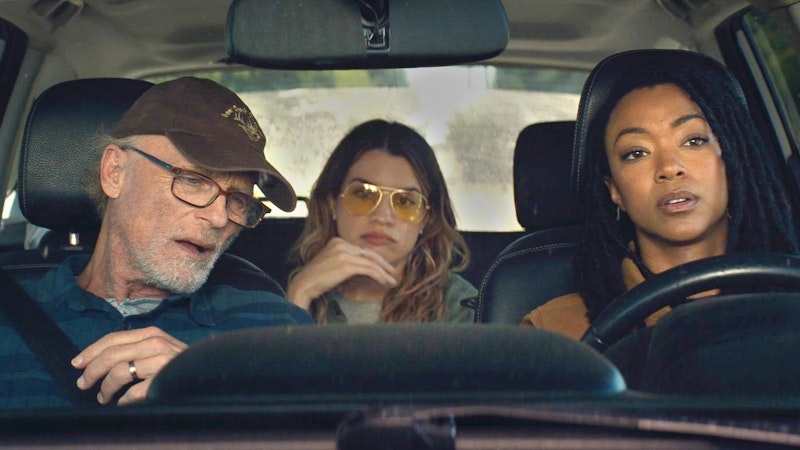Kyle Hausmann-Stokes’ debut feature My Dead Friend Zoe is a problem melodrama with fine acting and personal commitment. Based on the director’s experience recovering from the suicides of his own platoon mates, the film’s a sensitive and affecting entry in the genre of films about war’s aftermath and the lingering effects of PTSD. Its focus on those who aren’t here, and can’t be seen, though, is also a reminder of who’s largely absent in war films, and who American movies are, and aren’t, able to mourn.
The struggling veteran at the heart of the film is Merit (an excellent Sonequa Martin-Green), a former Army light mechanic in Afghanistan. Merit’s participating in court-mandated therapy sessions led by Dr. Cole (Morgan Freeman) after an industrial accident. She’s a reluctant participant, and partly out of necessity, partly as an excuse, she skips out to care for her Vietnam-veteran grandfather Dale (Ed Harris), who’s just been diagnosed with Alzheimer’s. Whether in therapy or at her grandfather’s lake house, though, Merit’s shadowed by Zoe (Natalie Morales)—her best friend and colleague in Afghanistan, now dead.
Morales played a similar role as returned best friend in 2022’s I’m Totally Fine, though she has a lot less screen time and presence in My Dead Friend Zoe. She’s a remarkably expressive actor, a perfect choice for a role where she needs to do a lot with glimpses; you’re never sure when she flashes onscreen whether she’s going to arrange her mobile features into goodtime Zoe distraction, helpful empathetic Zoe, or Zoe bearing an ominous freight of anger and guilt.
Dale’s also dealing with the recent death of his wife, and he and Merit are coming apart in parallel, if not exactly similar, ways. Dale forgets things and has flashes of anger, along with what appears to be a more long-term stubbornness. Merit, because she’s unable to talk about the biggest trauma in her life, finds herself unable to confront or concentrate on much of anything. She scrambles from minor crisis to minor failure, pausing for full-blown panic attacks when she tries to speak about and exorcize her friend.
The reason Merit can’t exorcize Zoe is that she doesn’t want to. The ghost in her head prevents her from functioning, but she’s afraid that leaving her behind will be a betrayal and a final, irrevocable loss. These dynamics are evident enough from the film’s beginning; the movie doesn’t so much progress as it circles around its knot of trauma, exploring Merit’s relationship with Zoe in past and present through flashbacks and through discussions with the ghost. We learn that Zoe was impulsive, difficult, protective of Merit, afraid of life after the army, and somewhat jealous perhaps of Zoe’s college opportunities and her stronger family support structure—a support structure that frays as we watch.
The movie’s conclusion isn’t surprising—it’s not really a film about its plot, though there’s a twist or two. The denouement is cathartic, and the acknowledgement that ghost Zoe and friend Zoe aren’t really the same person, and that Merit’s haunting herself, is powerful and moving. The call for more resources for veterans, and more acknowledgement of the challenges many of them face, is especially poignant at a moment in which VA resources are being gutted and in which a callous administration keeps bellowing dangerous retrograde messages about the armed forces and the people who serve in them.
My Dead Friend Zoe is a small film which deliberately eschews great ambition. That’s not bad, and no one film can do everything or be about everyone. Still, it’s hard not to notice that the phantom presence here is the usual phantom presence, which eclipses, by its immateriality, the bodies of others who never find their way into war films. There are a lot of US films about the cost of war on veterans, and many fewer—in fact almost none—about the cost of wars on the people targeted by the American war machine. Zoe does make a crack about imperialism and colonial violence. It’s not an insight that the movie’s willing or able to follow up on. That’s unfortunate in part because if we’re ever to have less specters like Zoe, we probably have to do better at seeing the people who exist over there, outside the frame of the American war film.

